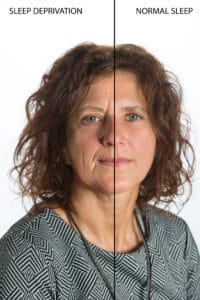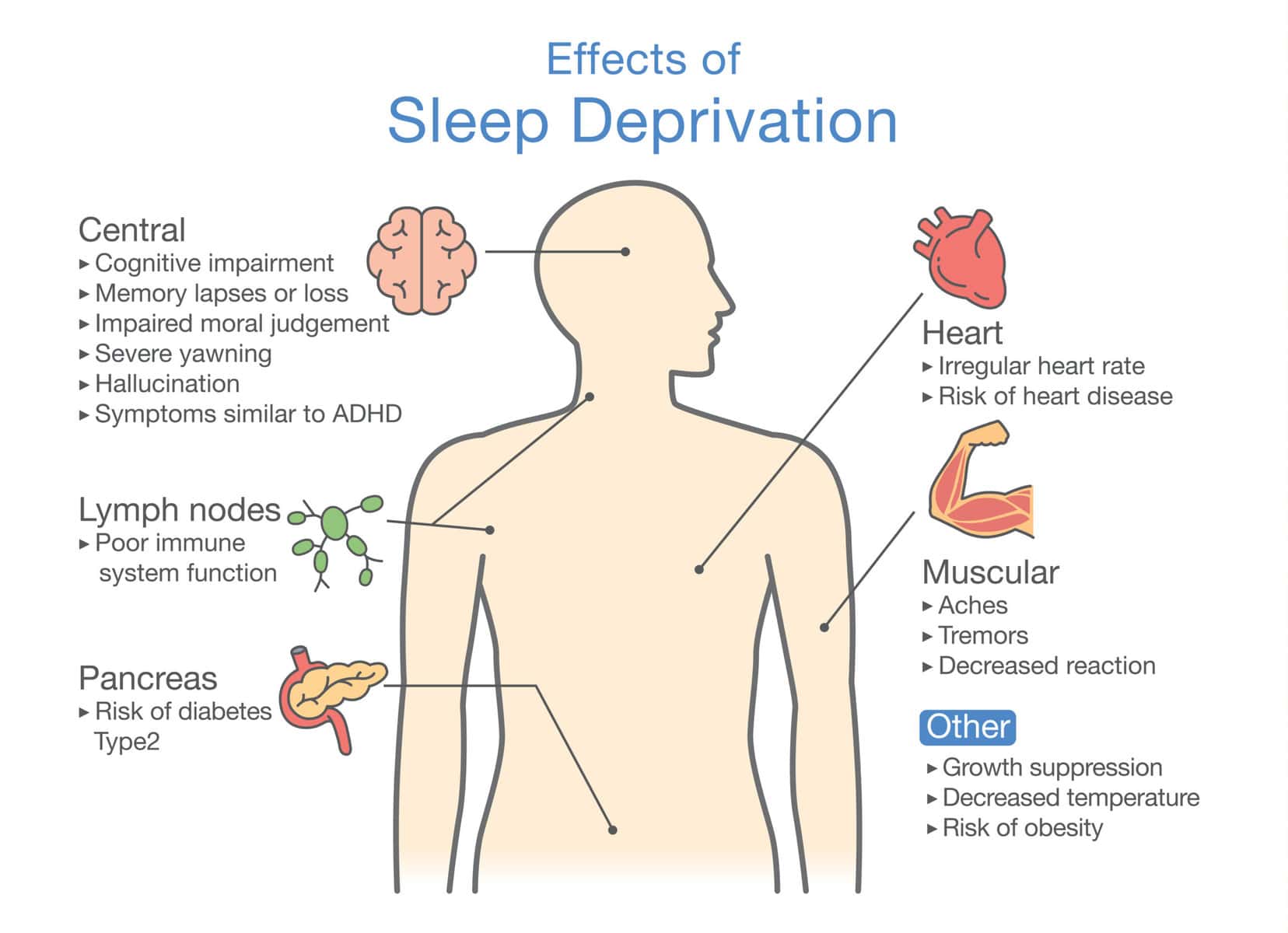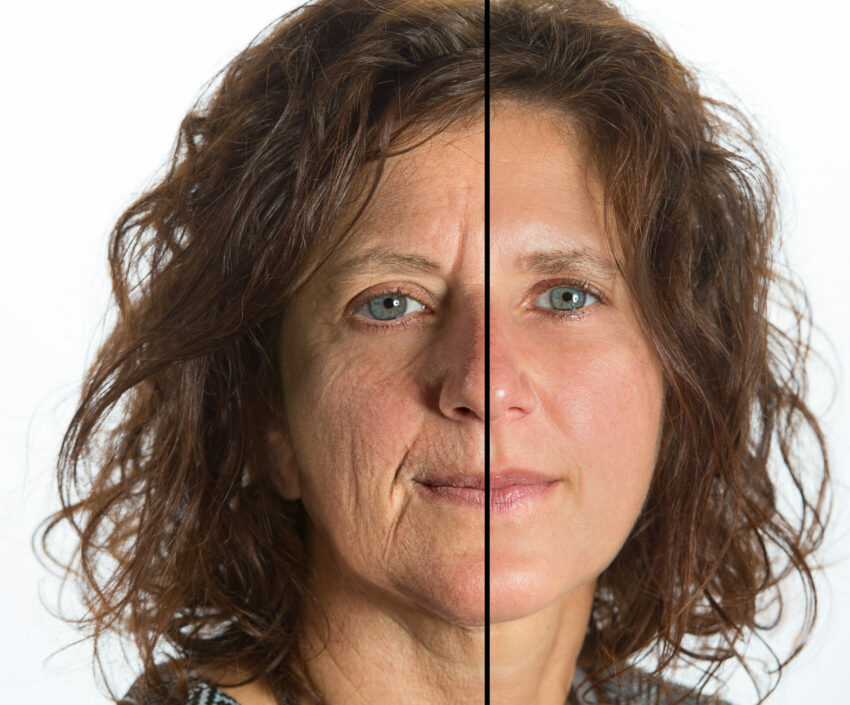Sleep deprivation is so common that between 50 and 70 million people are estimated to be affected in the U.S alone at any given time. What are the signs of sleep deprivation? Are the effects on your health permanent and how do you overcome it? Today, we will answer these questions and can you recover from sleep debt caused by sleep deprivation.
Table of Contents
Is Lack of Sleep the Same as Sleep Deprivation?
Although closely related, insomnia and sleep deprivation are not the same. With insomnia you you have difficulty going to sleep when you try. When you don’t get enough sleep or give yourself enough time to sleep it leads to sleep deprivation.
The effects of sleep deprivation on your health can be far more consequential than many people realize. Beyond just feeling sleepy all the time there are many physical and mental prices to be paid for long term lack of sleep.

What are the Signs of Sleep Deprivation?
The signs of sleep deprivation can take many forms which can affect many aspects of your day and even the impact your the job and social life. Do you:
- Have trouble staying focused and on task
- Have trouble following or making sense of conversations because you feel sleepy
- Have a tendency to forget what you are doing or a hard time remembering things
- Does your thought processes slow down and have to go over things repeatedly
- Have Poor balance or feel less coordinated
- Do you feel you eat more to stay awake, especially sweets or snacks
- Do you drink more caffeine to keep you going
- Nod off when not intending to (staring at your computer, reading, watching TV)
- Fall asleep quickly at bedtime
- Take frequent naps
- Feel fatigued, lethargic or run down during your day
- Feel grumpy
- Does your mood change such as feeling depressed, anxious, stressed, or paranoid thoughts
- Lack motivation
- Feel less interested in sex
What is the Cause of Sleep Deprivation
Sleep deprivation can be the result of the demands of a busy work schedule, stress, insomnia or other sleep disorders or medical conditions. It can also be behaviorally induced sleep deprivation which occurs when sleep is restricted in favor of some other activity such as work, school and studies, money making or even watching television. In some cases behaviorally induced insufficient sleep syndrome is a chronic condition prevalent in people with excessive daytime sleepiness.
Stages of Sleep Deprivation
Sleep deprivation occurs in stages:
- Stage 1: At least 24 hours without sleeping. The impairment at this level resembles being under the influence of alcohol at the point where it isn’t safe for you to drive.
- Stage 2: Symptoms of sleep deprivation intensify. Microsleeps in this stage are common and you have trouble thinking or focusing.
- Stage 3: You may find it difficult to communicate with others and can begin to experience severe symptoms like hallucinations.
- Stage 4: At this highest stage of sleep deprivation symptoms are the most severe with hallucinations common, You struggle to tell what’s real and what isn’t. For example, you may instantly go back and forth from sleep and dream to wake and not know which is real. I have personally had this experience after 4 days with no sleep.
Work and Lifestyle Affects of Sleep Deprivation

While eight hours of sleep per night is believed by many people as the amount of sleep you need, some may be good with a little more or a little less. Seven to nine hours is considered to be the range needed by most people.
Sleep deprivation occurs when an individual does not get the sleep they need over a period of time. The longer the period of time, the more the consequences mount up. Sleep deprivation symptoms include extreme daytime sleepiness, fatigue, and inability to concentrate, or having memory problems.
My personal experience
For my personal experience, I felt a certain stigma that I appeared to others as being lethargic and having a lack motivation or enthusiasm. Even though, it was not really the case.
I could still appear to function on the basics of the day but it gave the impression I was less than competent at what I was doing and sometimes annoyed others when I couldn’t remember things or keep up with the conversation.
Some people may be moody or irritable. Again, for me, if you have this behavior over a long period of time and someone doesn’t know you well, this can look like it is just part of your character.
That can give others a wrong impression and make work and social life more difficult. My relationships suffered. I was too tired to have a social life, and I couldn’t keep up at work. Sleep matters.

The Health Effects of Sleep Deprivation on your Body
Sleep deprivation can increase the risk or contribute to a number of other health conditions. The greater the sleep loss is, the stronger the influence on these health conditions may become. Physical effects of sleep deprivation include:
- changes to insulin release creating higher blood sugar levels and risk for type 2 diabetes
- Weakened immunity
- Increased risk of high blood pressure
- Heightened risk of heart disease due to increased levels of chemicals linked to inflammation, which plays a part in heart disease
- risk of weight gain/obesity
- Less sleep may contribute to diminished sex drive, although in men this may be due to receding testosterone levels
Behavioral Effects of Sleep Deprivation
Partial sleep loss over a period of days can have the same effect as total loss of sleep during a short period of time. So, just because you haven’t lost a lot of sleep all at once doesn’t mean you aren’t accumulating sleep debt. The loss may be as little as an hour per day. The results can be the same. If you lack sufficient sleep you may experience:
- Attention deficits such as the inability to stay focused on a task or completing it, difficulty following instructions or following a conversation
- Slowed memory function and the reduced ability to retain or recall memories.
- Depressed mood or irritability
- Repetitive behaviors such as staying on the same topic when a conversation has changed or continuing to perform a task even though it is already complete
- You may be more prone to accidents
The Longer Term Psychological Effects of Sleep Deprivation
If you have been losing sleep for a period lasting longer than 3 months your condition would be considered chronic sleep deprivation. In longer periods of sleep loss psychological effects may be encountered. This longer term lack of sleep may lead to:
- Depression
- Anxiety
- Paranoia
- Suicidal thoughts
Sleep debt – Can I recover from it

Sleep debt or sleep deficit is the accumulated effect of the sleep you lose. It may be the result of insomnia or other sleep disorders or medical conditions.
But, in many cases, sleep debt is the result of a pattern of not going to bed and staying there until fully rested. In addition, we don’t always notice the loss because we are less capable of recognizing it the longer it goes on.
In the end the only thing that can recover sleep debt is more sleep. But even though you sleep in on the weekends to “catch up” there are still lasting effects. Your body needs sleep on a daily basis.
Studies show that people who cut back on sleep and try to catch up on weekends show increased weight and changes in how their bodies use insulin and no improvement to other health conditions such as high blood pressure and heart disease.
Regularity in sleep matters. Research also suggests it would take four nights of regular sleep to make up for an hour of lost sleep.
Conclusion
Prioritizing sleep in order to get 7 to 9 hours of sleep each night is the best way to beat sleep deprivation and the lasting affects it has on your health. Naps can help, if they don’t interfere with regular sleep.
But paying off sleep debt can be difficult and still have impact on long term effects. Prioritizing a regular daily sleep schedule is best for long term health.
A good night of sleep will help you tackle the next day with better abilities to think and get things done without drifting off task and the effects of sleep deprivation on your health greatly reduced.
Sleep well, goodnight!

references
Extent and Health Consequences of Chronic Sleep Loss and Sleep Disorders
https://www.ncbi.nlm.nih.gov/books/NBK19961/
How Does Sleep Affect Your Heart Health

Sleep deprivation is a problem for many people.
You find many young people not getting enough sleep. College kids are notorious for studying and cramming for test late into the night Lot of people who feel they don’t need much sleep who keep hearing their peers saying they don’t need sleep either. Hense, they have problems staying awake and getting work done that needs to be done.
How did you correct your problem of not getting enough sleep?
I am still working on it. I still go through periods of insufficient sleep due to my our work schedules, but I am doing better as I learn more from my research. I started going to bed earlier and sleeping longer and sometimes use sleep aids on the weekends when I don’t have to work or drive early the next day. It has helped a lot to feel rested and active as I go into my work week.
Excellent information on sleep deprivation, it’s causes, and solutions. It’s true that sleep is a vital part of our health, and our ability to feel our best so that we can be at our most productive. I know when I don’t sleep enough, I am more likely to catch a cold, or develop the flu due to a weakened immune system as you mentioned. Thanks for sharing this most important health info. Tom
https://foodsreducebellyfat.com/best-sleep-aid-for-insomnia/
I found this article interesting as I have a tendancy to go to bed really late. I work from home and often have a 15 minute sleep after lunch. I always wake up feeling really energised, so assume it must make up for any lost sleep at night. I usually get between six and a half to seven hours sleep so a bit less than the required amount:)